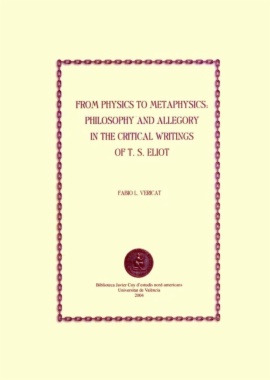Abans de dedicar-se per complet a la literatura, T.S. Eliot fou un estudiant seriós de filosofia. Aquest estudi pretén determinar la importància d'aquest fet en el seu desenvolupament com a crític literari. La intenció és argumentar que el canvi que Eliot va fer de la filosofia a la literatura, va ser instigat amb l'esperança de trobar en el camp literari un estil que havia vençut durant els seus estudis filosòfics.
- Cover
- Title page
- Copyright page
- Acknoledgements
- Contents
- Abbrevations
- Introduction
- Chapter I. Science and the Style of Philosophy
- Marriage, Literature and Philosophy
- Vers Libre and the Problem with Philosophy
- Literary Criticism and Scientific Rigour
- Chapter 2. Ghosts and the Cognitive Problem of Impersonality
- The "Presentation" of Metaphysics
- Contradictions and Unreal Objects
- Imaginary Objects, Immediate Experience and the "Correlative"
- Hamlet's Ghost
- Impersonality and the Frontier of Metaphysics
- The Parody of Science as Critical Style
- Chapter 3. Eternal History and the Cultural Self
- The Historical Sense and the Aesthetics of Impersonal Cognition
- The Collective and the Individual in Critical History
- Pragmatism and Faith
- Metaphysical Politics
- Souls and Personality
- Chapter 4. Towards the Articulation of Culture. Personal Experience and Metaphysical Definitions
- Blake and the Personality of Impersonality
- The Metaphysical Poets and Culture
- The Negative Style of the Dissociation: Dr. Johnson's "Life of Cowley"
- Thee Clark Lectures and Metaphysical Definitions
- Chapter 5. Philosophy and Mysticism
- Mysticism and Self-consciousness
- The Mystical Via Positiva and Rethorical Incarnation
- Richards and the Theory of Belief
- Chapter 6. Eliot's Allegorical Rhetoric
- Allegory as a Rhetorical Strategy
- Rhetoric and the Sound of Sense of the Word
- Figures and Prophecy
- The Failure of Discourse: Vita Nuova and "Paradiso"
- Chapter 7. Historicism and Style as Prophecy
- Prejudice and the Metaphysical Perspective
- The Sincerity of Self-consciousness
- The Historical Sense of the Present
- The Historicism of Eliot's Rhetorical Development
- Bibliography

